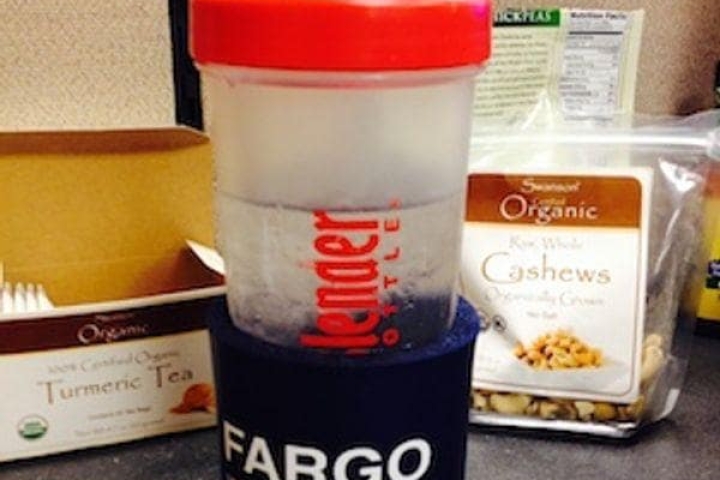18 Tips and Foods to Support Joint Health
18 Tips and Foods to Support Your Joint Health
Maintaining healthy joints at any age is essential for mobility and overall wellness. From the foods you consume to the way you structure your day, numerous choices can be made to ensure you're providing your joints with the nutrition they need for optimal performance.
Here are some important tips for supporting joint health:
1. Maintain a healthy weight
The heavier you are, the greater the pressure on your joints.1 Achieving a healthy weight can significantly reduce stress on your joints and benefit your overall health.
2. Eat a healthy diet
A nutritious diet supports every aspect of health, including joint health. Below is a list of the best foods for joint health, as well as those to avoid.
3. Limit caffeine intake
Though caffeine provides energy, it can adversely affect your joints.2 Consider reducing your coffee consumption and eliminating soda from your diet.
4. Take joint health supplements
Some individuals may need additional support for joint health. In such cases, consider supplements like glucosamine, chondroitin, hyaluronic acid, MSM or a combination formula.
5. Add a multivitamin and mineral supplement
Even the best diets might lack certain nutrients. If you need to bridge nutritional gaps, consider taking a multivitamin and/or mineral formula, or specific supplements like vitamin D or calcium.
6. Maintain a fitness schedule
Diet and exercise are interconnected, and this applies to joint health as well. Engage in low-impact exercises to minimize strain while maintaining an effective workout routine.
7. Buddy up for walks or group fitness
While some prefer solo workouts, others benefit from group activities. If you need extra motivation or company during exercise, find a fitness buddy and choose enjoyable activities to avoid viewing exercise as a chore.
8. Avoid excessive workouts
Exercise is crucial for joint health, but it's important not to overdo it. Establish a routine that suits you and adhere to it 3-5 days per week, allowing days off for your joints to rest and strengthen.
9. Don’t forget to stretch!
Stretching is a vital part of any workout. Ensure you allocate time for cooling down and stretching to prevent your body from feeling overly fatigued or tight post-exercise. This also helps alleviate any soreness if you remain seated for prolonged periods afterward.
10. Switch between sitting and standing throughout the day
Keeping your joints active is important, but constant activity isn't necessary. A balance between sitting and standing throughout the day promotes strength and mobility.
11. Maintain proper posture
Posture is crucial for joint health.3 Poor posture, such as slouching at your desk, can lead to upper body joint strain over time. Make a conscious effort to maintain good posture throughout the day and use a chair with adequate lower back support if you predominantly sit at work.
12. Ditch high heels
High heels, despite their appeal, are detrimental to joint health. They exert excessive pressure on your knees, potentially leading to future knee issues. Opt for flats or wedges instead of high heels.
13. Wear shoes with proper cushioning
Comfortable shoes lead to happier joints. Choose footwear that provides stability and suits your arch type. Consider adding shoe insoles for additional comfort.
14. Get a massage
Consider this your permission to indulge! A massage can help loosen both your joints and muscles, particularly useful if you frequently exercise and experience regular stress.
15. Reduce stress
Managing stress is crucial. Techniques such as breathing exercises, yoga, taking a relaxing bath, drinking chamomile tea, coloring, or reading can effectively reduce stress. Find an activity you enjoy and make it a regular part of your routine, even if just for 15 minutes a week.
16. Get plenty of sleep
Adequate sleep is vital for overall health, including joint health. Along with rest days, sufficient sleep allows your joints to recover from daily activities. Generally, 7-9 hours of sleep per night is recommended,4 but consult with your healthcare provider to determine the appropriate amount for you.
17. Avoid excessive TV watching
While it's tempting to binge-watch, prolonged sitting and staring at screens can harm more than just your joints. Limit screen time to a couple of hours, focusing on moving around and giving your eyes a break from all types of screens.
18. Stop smoking
Quitting smoking is beneficial for all aspects of health. Develop a reasonable plan and timeframe to quit smoking, and use the savings for health-promoting purchases like new fitness shoes or that well-deserved massage.
As mentioned, a healthy diet is crucial for joint health. Here are some excellent food and drink choices to consume, as well as some to avoid if you aim to improve your joint health.
Foods & Drinks to Support Healthy Joints:
- Berries
- Oranges
- Cherry Juice
- Red Apples
- Onions
- Orange Veggies
- Dark Leafy Greens
- Cruciferous Vegetables
- Turmeric
- Basil
- Ginger
- Oily Fish
- EVOO
- Nuts
- Kefir
- Low-fat milk
- Wine
Foods & Drinks to Avoid:
- Cheese
- Trans Fat
- Bacon
- Soda
- Beer
Always serving our customers,
-Your friends at BubbForest
*These statements have not been evaluated by the Food and Drug Administration. These products are not intended to diagnose, treat, cure, or prevent any disease
Sources
1. Why Weight Matters When it Comes to Joint Pain. Harvard Medical School. Read source.
2. Understanding Arthritis. Web MD. Read source
3. Good Posture Tips. Mayo Clinic. Read source
4. How Much Sleep Do I Need? CDC. Read source





Leave a comment